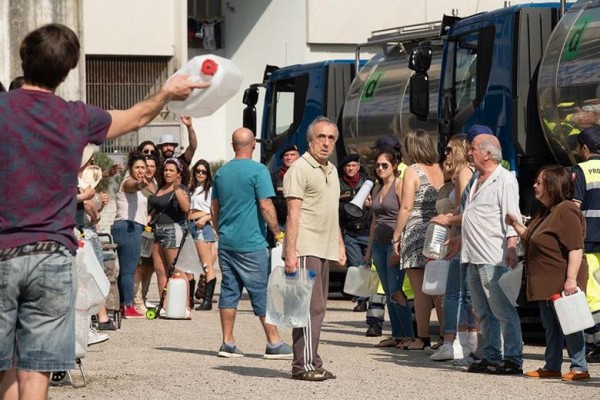-
DRY/SICCITÀ (Paolo Virzì 2022)
PAOLO VIRZÌ: DRY/SICCITÀ (2022)

SILVIO ORLANDO (CENTER) IN DRY/SICCITÀ
Virzì's most choral film
Almost at the center of this symphonic "comedy" - if you can make a comedy about Rome running out of water - is Loris (Valerio Mastandrea), gray hair in a bun behind his head, sweaty, nervous, stressed, chauffeuring a dingy limo talking to passengers - who aren't really there. A long time ago, 2007 to be exact, I reviewed a movie starring Mastandrea, much younger of course, who was a would-be musician called Stefano. I described another character, the brother, as one who "survives on manic energy and a variety of antidepressants" and is "clearly at the end of his tether in more ways than one." How little things have changed. The brothers are members of an industrial family on the skids because their big fruit packing company is rudderless and in debt. The business "is showing huge losses," I wrote. "Everything is in hock, and the workers are owed three months' pay."
That is the sort of situation going on here, even though it's more ecological than economic. Though Rome is running out of water - which we don't really see so much; there still seems to be plenty, just not as much - the problem is aggravated by the corruption and confusion of the local bureaucrats and politicians, who are covering up and dodging the issue. I described the 2007 film as mostly made up of "mildly manic and often amusing set pieces that move us around among its multiple locations with a steady rhythm." Check. That film was Gianni Zanasi's Don't Think About It/Non pensarci. Mastandrea's job is more sedentary this time (he's 51 now, was 36 then). The "mildly manic" scenes involve other actors. Mastrandrea though, imploding in his car, is great. He expresses the disorder, the madness of the Rome of this film perhaps better than anybody else.
Virzì's problem in this film is partly that it really is a disaster film, and he doesn't know how or hasn't the means of lacks the ingenuity to convey something so expensive as the capitol of Italy running out of water. (It's actually running out all over the country, even more expensive to depict.) It's not a good sign that The Hummingbird director Francesca Archibugi wrote the screenplay here: The Hummingbird is a film quite blithe about being too complicated to follow. There's uncertainty in the conception here. It's a three-year drought. Is that so bad? Well, really, how bad is it? Bad enough so the Tiber river has dried up as CGI overhead shots of it show us. There is focus also on a possible epidemic appearing at the Policlinico. There's a fancy thermal baths owned by a Trump-like corrupt family whose mouthpiece declares to a displeased and skeptical public that the considerable amount of water it uses is obtained "privately," brought in in tanks daily. (It's not true.)
So the focus shifts to disease and to corruption and deception, not just the water supply as such. As Jonathan Romney says in his Screen Daily review, the audience is left "gasping" by all the "narrative plate-spinning." But as he also says, the whole thing will probably make more sense to the local audience, for whom many of the cast members are well-known faces. Another one is Tomasso Ragno, who plays out of work actor turned social media personality Alfredo, who polishes his online image while his wife Mila (Elena Lietti) works in a supermarket and plans to hook up on the side with a lover. Alfredo’s ex-wife Sara (Claudia Pandolfi) has something more serious to deal with: confronting the new disease. Wisdom about the relation of poverty to waterlessness is provided by young African asylum seeker Sembene (Malich Cissé). In contrast an initially sensible and knowledgable professor of hydrology (Diego Ribon) is dazzled and becomes corrupted in a single day by the fame the new crisis has brought him.
The scenes with Valerio Mastandrea in the car still remain the ones we can dig our teeth into. His scenes are matched in soulfulness, though, with those involving the popular actor Silvio Orlando as Alfredo, an aging accidentally released prisoner, now wandering around and exploring his past. Meanwhile there is a glitzy movie star featuring Monica Belluci playing a version of herself, and a cameo by Korean auteur Bong Joon-ho. Romney points out there is a lighter touch here than in Crash or 21 Grams (Yes, there is that.)
This material is still way too complicated and disjointed when introduced. But it begins to flow together and make more sense toward the last of the over two hour runtime. As various critics note, the choral effect and flow resemble Virzì's Human Capital, though the comparison is misleading because the latter is so neatly held together and provided with a satisfying outcome by a kind of murder mystery. Romney generously concludes that Dry is overall "an intelligent, ambitious modern melodrama with a bracingly cynical streak." I can still only wanly recommend it, but there are good scenes.
Dry/Siccità, 124 mins., debuted at Venice Sept.8, 2022, showing at a hanfful of other small European festivals and releasing in Italian theaters Sept. 29, 2022. Screened for this review as part of Open Roads: New Italian Cinema (June 1-8, 2023).
Friday, June 2 at 6:00pm (Q&A with actor Tomasso Ragno)
Thursday, June 8 at 3:00pm
Last edited by Chris Knipp; 05-29-2024 at 03:01 PM.
 Posting Permissions
Posting Permissions
- You may not post new threads
- You may not post replies
- You may not post attachments
- You may not edit your posts
-
Forum Rules





 Reply With Quote
Reply With Quote
Bookmarks